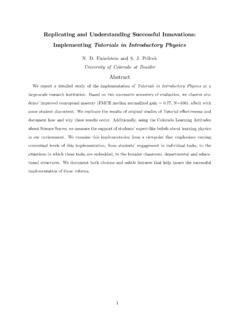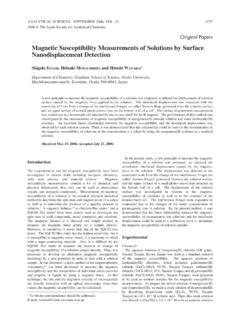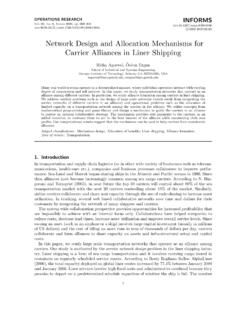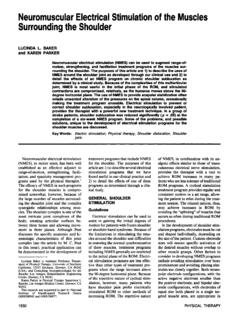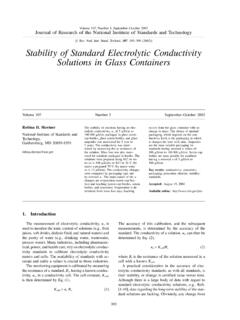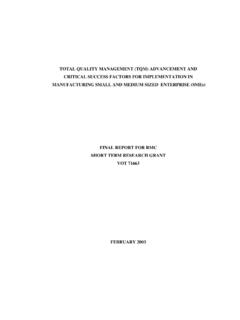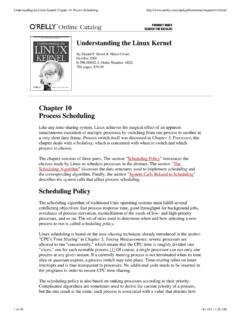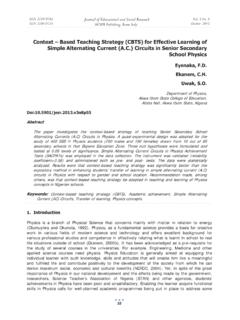Transcription of Cross-Cultural Etiquette and Communication in Global ...
1 International Journal of business and Management; Vol. 7, No. 16; 2012 ISSN 1833-3850 E-ISSN 1833-8119 Published by Canadian Center of Science and Education 130 Cross-Cultural Etiquette and Communication in Global business : Toward a Strategic Framework for Managing Corporate Expansion Ephraim Okoro1 1 School of business , Howard University, Washington, USA Correspondence: Ephraim A. Okoro, Department of Marketing, School of business , Howard University, 2600 Sixth Street, NW, Washington, 20059, USA. Tel: 1-202-806-1545. E-mail: Received: March 22, 2012 Accepted: June 8, 2012 Online Published: August 16, 2012 URL: Abstract The expanding scope of business corporations in the first decade of the twenty-first century is drawing much scholarly attention, and the trend has been described as a fact of life that defies the stretch of human imagination.
2 The concept of Global economy has expanded consumer awareness, defined new standards and rules of operations, and increased the need for national and corporate interdependence. Multinational organizations are exploring opportunities around the world, demonstrating sensitivity towards cultural differences in order to gain from the proliferation and growth of international enterprise. Recent studies indicate that while some corporations compete successfully in the Global marketplace, others have failed to sustain their competitive advantage because of cultural imperialism or inadequate acculturation of their managers on international assignment. Corporate analysts argued that the key to Global business success depends on effective Cross-Cultural Etiquette and Global workforce diversity management.
3 Other significant studies emphasized that Global managers should be trained in interpersonal relationship and group Communication competence, and should be equipped with Cross-Cultural negotiation skills that can maintain Global competitiveness. Increasingly, corporations recognize the value of preparing Global managers, because business objectives of are not been achieved primarily because of deficiencies in Cross-Cultural Etiquette . Against this background, this study provides a constructive evaluation and analysis of Global Etiquette and Cross-Cultural Communication for managers in international assignments. The study then proposes a strategic role for organizations to achieve adequate return on investments and to succeed in international competitiveness through cultural awareness, sensitivity, and reciprocity.
4 Keywords: Cross-Cultural Etiquette , international competitiveness, Global managers, cultural awareness, cultural sensitivity, Cross-Cultural Communication , globalization 1. Introduction A survey of current literature consistently indicates that the contemporary business context is globally-interdependent and interconnected. It further demonstrates that corporate leaders should provide opportunities for their managers in international assignments to learn Cross-Cultural business Etiquette in order that they will excel in their interpersonal relationship overseas. Furthermore, training in Cross-Cultural Etiquette will enable managers for foreign assignments to cope with cultural differences. Studies (Assante & Yin, 2007; Chaney & Martin, 2011) explain that Global orientation helps managers relate well with people from other countries and equips them to take advantage of opportunities available in today s culturally-diverse Global marketplace.
5 As Harris and Moran (2008) argued, corporate cultures of Global businesses impact how managers deal with the competitive environment, especially with basic Communication Etiquette . In preparing managers for multinational assignments, their training should include cultural sensitivity, understanding the importance of maintaining business relationships, and impression management. They should be informed about the complexities in international culture and human resources management. Cook and Cook (2011) stress that as businesses globalize, there continues to be a compelling need for Cross-Cultural awareness, knowledge of business Etiquette , culture-specific management styles, and intercultural exchanges, because managers will find themselves faced with multiple challenges emanating from domestic cultural issues and traditional systems.
6 Chhokar, Brodbeck, and House (2007) highlighted the importance of Global awareness and cultural assessment across developing and developed parts of the world in order to avoid failures of Global managers in their International Journal of business and Management Vol. 7, No. 16; 2012 131 assignments. It is, therefore, critically important to appreciate such things as dressing to make lasting impressions, knowing how to introduce oneself and others during business meetings and at other business -related occasions, and understanding basic or appropriate Communication Etiquette . With the integration of world economic systems, production and consumption activities, and markets, it has become increasingly important that corporate leaderships develop a level of sensitivity necessary to communicate and negotiate cross-culturally.
7 The critical process of making decisions, reaching mutual agreements, and building consensus has taken a new dimension because of differences in business Etiquette and ethical practices. As Connerley and Paul (2005) noted, Cross-Cultural Communication skills and interpersonal negotiation competence are a pre-requisite to effective management of multination workforce. Research evidence demonstrates that corporations are increasingly establishing joint ventures, building strategic alliances, and establishing direct investments around the world. Therefore, Global managers should be adequately equipped with interpersonal and nonverbal Communication competence for multinational responsibilities. Recent Global trends and developments highlight the need to emphasize business Etiquette and Cross-Cultural skills as critical management imperative, because of the increasing number of organizations establishing Global strategic alliances.
8 Additionally, the Global environment of business management and marketing involves effective and efficient Communication among diverse stakeholders, which makes Cross-Cultural Etiquette and ethics critical skills. In recent years, scholarly debates and conferences have focused on the changing attitudes in business environments. Globalization of the economy, diverse workforce, and the growth of electronic Communication emphasize that appropriate business behavior leads to sustainable business relationships across nations. As Cook and Cook (2001) stressed, more than ever before business Etiquette now plays a critical role in the success or failure of organizations competing for Global market-share. business Etiquette transcends the use of utensils at social events and introductions at special occasions.
9 Managers in Global assignments should be trained in such essential things as wearing proper attire and in how to interact with colleagues in a variety of cultural settings, because knowing the basics of Etiquette is significant to the success of international managers. In addition to administrative and educational qualifications, proper manners and acceptable conduct will be highly considered in the evaluation of a manager in overseas assignments. Indeed, the inability of managers to demonstrate good or appropriate manners and personal conduct in the workplace has been cited as conditions that determine success in multinational management. A manager s ability to demonstrate intelligence, competence, and leadership skills as well as his or her ability to engage in appropriate business Etiquette is valuable in multinational business transactions.
10 In their study of Global business Etiquette , Chaney and Martin (2011) and Cook and Cook (2011) place a high premium on managers manners, public or professional behaviors, and appropriate self-comportment when conducting official duties in international business and social settings. In addition to representing the interest of their organizations, Global managers credibility and integrity is at stake at all times based on the evaluation of Etiquette . For example, in Global business and social environment, appropriate and respectful behavior and conduct would include sensitivity to cultural differences when making introductions, exchanging business cards, acknowledging position and status, communicating with the proper tone across cultures, dining practices and habits, tipping Etiquette , giving gifts, and using clear nonverbal communications.

